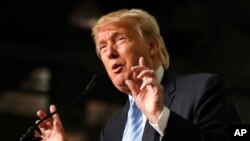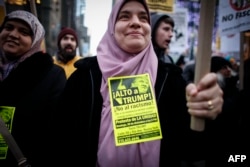America's choice for president will affect nations across the globe. VOA reached out to people in Africa, Asia, Europe and the Middle East and found that they have strong opinions about the campaign and each party’s leading candidates, Democrat Hillary Clinton and Republican Donald Trump.
Simon Khaya-Moyo, a spokesman for Zimbabwe's Zanu-PF party in Harare, spoke harshly about recent violence between Trump supporters and opponents.
"They claim to be the best in the world in terms of democracy," he said. "If what happened in Chicago is the best, then God forbid. They should stop pretending to be the champions of democracy, but of violence."
In African cities, particularly Nairobi, VOA found strong support for Democratic candidates. Kenyans are mindful of derogatory statements attributed to Trump.
"He calls us stupid, and I don't like it," said Faith Kenyana, a student at the University of Kenya. "It's like he hates Africans."
WATCH: Citizens across globe weigh in on Clinton, Trump
Russians, on the other hand, appear to favor Trump. They perceive him as being more of a friend to Putin than is Clinton, and their comments reflect growing anxiety over Moscow's chilled relations with Washington.
"It's my wish that the new president of America will be more loyal to Russia, so that there's no cold war," said Elena Saltykovskaya, a business manager.
Political necessity
China's media reports that citizen interest in the U.S. vote has been growing. But in the streets of Beijing, many confessed they haven't been following the campaign to garner support for the nomination.
"I just know a little about Hillary and Trump," said Chen, who works in the finance industry. "Personally, I've heard before that Hillary is sort of anti-China, and Trump is sort of anti-China. So, I don't really like either of them."
But a man who identified himself as Zhang called the elections "great" and said every country could learn from them.
"I am more familiar with the former Secretary of State [Clinton],” he said. “At least she has that experience. She's tough and not necessarily that friendly to China, but the things [she has said or done] are more a political necessity."
People in the streets of Seoul, South Korea, were reluctant to speak out, but a few said they were worried about Trump's charge that South Korea is not paying its fair share toward maintaining U.S. troops stationed there and in Japan.
"As Trump is conservative, I think there may be some disadvantages for South Korea in many ways if he becomes a president. So I pay more attention to Hillary," said Kim Sang-young, an IT specialist.
Global election
VOA correspondent Anjana Pasricha reports that Indians are paying close attention to the race and tend to favor Democrats.
"It's not just an American election, it's a global election," said Abhimanyu Nohwar, a New Delhi product designer. "And in some ways, everyone is connected to this global vote."
He said he supports Vermont Senator Bernie Sanders, a Democratic candidate.
"There are too many, from my perspective, there are too many business interests, too many commercial interests that are driving politics these days and not enough human interest is driving politics," he said. "At the end of the day, you have to live on a planet together, and that should come first. So I think any candidate that is prioritizing humanity over business interests, would definitely get my vote."
In neighboring Pakistan, VOA found strong opposition to Trump.
"We are definitely against Trump, honestly, because he has a really negative opinion of Muslims, and particularly Pakistanis," said physician Naeem Aslam.
Trump's remarks about Muslims have resonated deeply across the Middle East, and not surprisingly, those with whom VOA spoke in Cairo expressed outrage.
"In the case of this candidate [Trump] who appears to be winning, what we can say is that he is a racist and he makes statements that reflect Nazi ideas," said Khalifa Gaballah, Arab affairs editor at Egypt's Al-Masry Al-Youm newspaper. "He wants to ban Muslims from America. He refuses to accept Syrian refugees. We don't even think he believes what he says."
But Egyptian soldier Mostafa Mohammad summed up the feeling of many in the region as it relates to political unrest and the rise of extremist movements: "We are concerned with our own government and economics and we don't care about the president of America or any other country," he said.
The following people contributed to this report: Anjana Pasricha in New Delhi; Ayesha Tanzeem in Islamabad; Amos Wangwa and Jill Craig in Nairobi; Emilie Iob in Abdijan; Chris Stein in Lagos; Bill Ide in Beijing; Brian Padden in Seoul; Steve Herman in Bangkok, Heather Murdock in Cairo and Daniel Schearf in Moscow.








